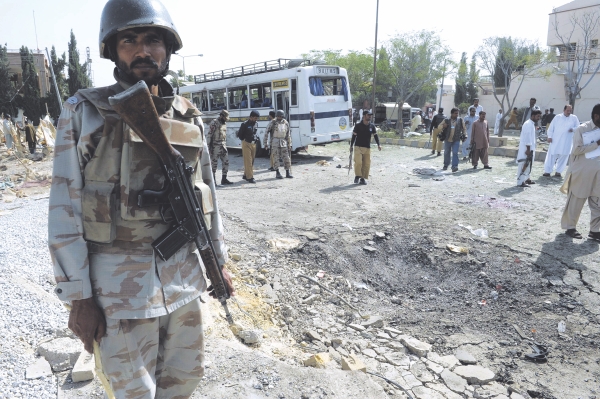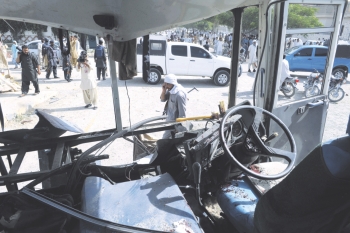| Home - Back Issues - The Team - Contact Us |
 |
| Volume 11 |Issue 25| June 22, 2012 | |
|
|
International THE WEAKER SIDE Moeed Yusuf I must confess I can't make head or tail of Pakistan's present stance of the US-Pakistan relationship. It beats me why we cannot see that we are shooting ourselves in the foot by letting the impasse drag on. Last I checked, we were still dealing with a superpower and we hadn't made it to the exclusive club yet. Let us revisit International Relations 101: it deals with the importance of power differentials. States may be equal in legal terms but their behaviour is always underpinned by their relative strength. Weaker states must keep this fact at the centre of their calculus when devising bargaining strategies. This does not imply that weaker parties should readily submit to the will of the stronger. All states have the option of allying with others, bandwagoning — joining hands with the stronger party — or building their own capabilities to stand up to the strong.
Out of these, creating alliances are often the preferred option. But if strong alliances are not a possibility, the weaker party's bargaining position deteriorates and it is left ensuring that it does not lose all its leverage. And for that, the rule of thumb is to start picking your fights carefully — standing your ground on issues of critical importance and letting go, preferably after orchestrating face-savers, on things not central to your long-term objectives. The logic is not much different than for asymmetric human relations. How does Pakistan's position match up with this? As far as I can decipher, Pakistan "critical" concern is the makeup of post-2014 Afghanistan. Pakistan's repeated demand for a role and say in shaping the Afghan endgame flows from this. And to have any chance of succeeding at it, it needs to ensure that the relationship with the US does not break down. Interestingly enough, there is complete consensus on this across the civil-military spectrum. Privately, each and every major political party — even those whose elections campaigns are based on anti-US rhetoric — and the military unequivocally agree that we cannot afford a ruptured relationship with the US. Now, let us examine Pakistani actions since Salala. Pakistan took a stand, asked for a pause, and initiated a review of the relationship through the parliament after the Salala incident. Nothing wrong with that as Pakistan had the upper hand after the Salala tragedy and used it as an opportunity to gain concessions from the US. But then came a series of blunders. First, the parliamentary review dragged on far longer than it should have, with the result that the initial sympathy for Pakistan and the feeling among most that Pakistan was justified to redefine the terms of the relationship disappeared.
Further, the parliamentary resolution, when it came, boxed Pakistan into a corner. It made demands which anyone even with a rudimentary understanding of the US interagency system would have advised against. It forced Pakistan to stand its ground on issues more to do with pride and ego, or on policies seen as non-negotiable in Washington (drones), and less with the ultimate interest of finding an acceptable deal on Afghanistan. Mind you, Pakistani diplomacy did manage to get one major concession that one never thought was likely — or even possible. Even before the parliamentary review was over, the Pakistani mission in Washington had succeeded in convincing the US administration to offer a formal apology. The apology was put on the table but, rather absurdly, Islamabad deferred. Things have changed since: Haqqanis have been once again implicated in attacks in Kabul and the US. The presidential race is in full swing. And thus, the original apology is off-the-table — for good it appears. And yet, back in Islamabad, the view seems to be frozen in time; the apology continues to be the principal demand and vital interests are being held hostage to it. Finally, the good old ground lines of communications (GLOCs). This, along with clout over the Taliban, was Islamabad's two trump cards all along. States have the right to utilise their prize cards when they deem fit, but again they should do so with the aim of furthering their ultimate goal. It would have made sense for Islamabad to shut down GLOCs to signal the costs for the US for not entertaining the weaker side's grudges but then reopen them before the stronger party was forced to seek alternative options. Instead, Islamabad has managed two things: upset the 30-odd Nato countries, including countries like Britain and Turkey, whose troops are as affected by the closure of the supply routes (remember the importance of allies for weaker states when they compete with stronger ones); and it has forced the US to shift even more of its dependence on the Northern Distribution Network. The word in Washington is that it is costly, but it has helped Nato realise that Pakistan's routes are not entirely irreplaceable after all. Failure to open the GLOCs in a timely manner also overshadowed what I thought was the one right move by Islamabad during this period i.e. participation in the Chicago summit. Domestic criticism notwithstanding, the reality is that, akin to Bonn-II, Pakistan's absence would have signalled its lack of interest on Afghanistan's future and opened space for generous Pakistan-bashing. So what has Pakistan ended up with? It has prioritised domestic political expediency and intangibles like pride over the need to get things back on track with the US to focus on the impending Afghan transition. By holding out, its only remaining trump card — facilitation of talks with the Taliban — has also been rendered useless. As for those who say the US will blink sooner or later, here is a reality check. The mood in Washington is grimmer than ever. Pakistan has no friends left here; the logic of punishing Pakistan is accepted far more readily. This leaves Pakistani diplomacy in an impossible position. Underappreciated but noteworthy, so far it has held out against heavy odds — it manoeuvred in Washington to get an unconditional invite for Chicago which seemed impossible just days before it was extended, and rather remarkably, it has managed to find visible support on Capitol Hill to block bills seeking aid cuts and other conditionalities on support to Pakistan. Laudable as it is, it won't last if the policy paralysis in Islamabad persists. Clearer thinking is urgently needed in Islamabad on how to prioritise critical interests over secondary ones. The current stance has made Pakistan less, not more, relevant in the South Asian geo-strategic game. The writer is South Asia adviser at the US Institute of Peace, Washington, DC.
|
||||
Copyright
(R) thedailystar.net 2012 |

